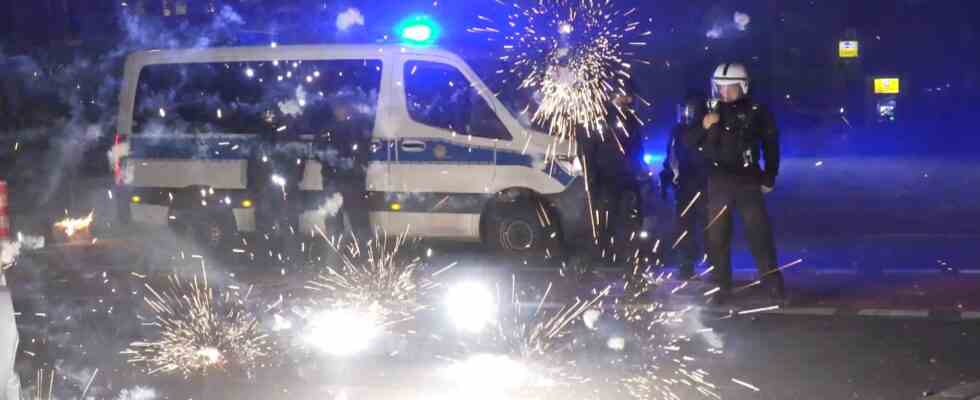FAQ
Status: 01/02/2023 4:32 p.m
The attacks on emergency services on New Year’s Eve are stunned. The call for stricter laws is getting louder. How are the acts already punishable? And how realistic is a firecracker ban? An overview.
According to Section 223 of the Criminal Code (StGB), anyone who intentionally physically abuses other people or causes damage to their health commits bodily harm. So if firecrackers and rockets are thrown or fired at people in a targeted manner and they suffer burns or a sudden hearing loss, this is of course punishable. And attempting to cause bodily harm is also a punishable offence.
Firecrackers are ‘dangerous tools’
If firecrackers and rockets are used in the act, it is not just “simple bodily harm”. Because: Anyone who commits physical harm “using a weapon or another dangerous tool” must answer for “dangerous physical harm” (§ 224 StGB). Fireworks are not classic weapons because they are not intended to cause injury to people. According to the law, however, “other dangerous tools” are equivalent to weapons when it comes to bodily harm. These definitely include firecrackers and the like, because in a specific case they are likely to cause serious bodily harm.
The law provides for harsher penalties for dangerous bodily harm than for simple bodily harm. A fine is no longer possible. The law provides for a minimum of six months and a maximum of ten years imprisonment. How high the penalty is in the end in each individual case depends on many factors, including previous convictions and behavior after the crime. At the end of the criminal proceedings, the court decides which punishment is appropriate to the guilt.
resistance to forces
While bodily harm can be committed against anyone, the law also has special provisions for certain crimes against emergency services. For example, anyone who resists police officers when carrying out official duties or by threatening them with violence is liable to prosecution for resisting law enforcement officers (Section 113 of the Criminal Code). It is not necessary for someone to actually be hurt, violence or the threat of it is sufficient.
If the offender is carrying a dangerous tool, the law no longer allows a fine. The range of penalties then varies between six months and five years imprisonment. It is enough for the penalty to be increased that the perpetrator has the firecrackers in his pocket when he did the crime. In the case of a so-called physical attack, i.e. a violent action aimed directly at the body, the range of punishment also increases. Even then, a fine is no longer possible.
Extension to fire and rescue services
In 2011, the group of people requiring special protection was expanded. Since then, anyone who, in the event of an accident, general danger or emergency, uses violence or threats of violence to obstruct those providing assistance from the fire brigade, civil protection or an emergency service, or who physically attacks them in these situations, is just as liable to prosecution. If emergency vehicles or other equipment are damaged, there is also property damage.
“The penalties would be severe,” says Kolja Schwartz, SWR legal editor, about penalties for rioters on New Year’s Eve
tagesschau24 2:00 p.m., 2.1.2023
Firecracker ban interferes with fundamental rights
After New Year’s Eve, there are also discussions about completely banning the firing of New Year’s Eve fireworks by private individuals. Such a ban would at least interfere with people’s basic right to free personal development. With good justification, however, the legislature could probably decide to do so. The ban on fireworks already applies to the rest of the year, and in the past two years it also applied to New Year’s Eve due to the corona. Whether such a ban makes sense for everyone because some people misuse the fireworks for criminal offenses is another question that politicians must first answer.
Dash cams to solve crimes?
The German fire brigade union in Berlin also calls for the use of dashcams, i.e. small cameras behind the windshield of fire brigade vehicles, to investigate crimes. According to the current legal situation in Berlin, that would be legally possible. According to the General Safety and Order Act, police officers and firefighters may use cameras on their bodies or in vehicles in public spaces, both for measures to avert danger and to prosecute criminal offenses.
However, these cameras must not record the entire operation automatically, but only be switched on when this is necessary to protect against a risk to life and limb. In addition, the recordings must be deleted immediately after one month if they are no longer needed, for example for criminal prosecution or to check the legality of police measures.

